- Home
- David Gemmell
Morningstar Page 2
Morningstar Read online
Page 2
The last of the villains loosened his hold on the girl, throwing her to the ground and sprinting away into the shadows. As the girl fell, she struck her head on the cobbles. I ran to her, lifting her gently. She moaned.
“You bastard! I’ll see you dead! You’ll not escape me!” shouted a voice from an upper window. I glanced up to see a bearded man upon the balcony. He was hurling abuse at the newcomer.
It did not seem to perturb the fellow. Swiftly he wrested his sword clear of the corpse, then gathered his second boot, which was lying some distance away against a wall.
“Help me with her,” I ordered him.
“Why?” he asked, pulling on his boot.
“We must get her to safety.”
“There he is! Take him!” screamed the man on the balcony. The sound of running footsteps came from the alley.
“Time to go,” said the newcomer with a bright smile. At once he was on his feet and running.
Armed men rushed into sight and set off after him. The officer of the watch approached me. “What is happening here?” he asked.
I explained briefly about the attack on the girl and of our sudden rescue. He knelt by the still-unconscious woman, his fingers reaching out to feel the pulse at her throat. “She’ll come around,” he said. “Her name is Petra. She is the daughter of the tavern keeper Bellin.”
“Which tavern?”
“The Six Owls; it is quite close by. Come, I’ll help you carry her there.”
“Who is the man you are chasing?”
“Jarek Mace.”
He said the name as if it were one I should know, but when I professed ignorance, he smiled. “He is a reaver, a thief, an adulterer, a robber—whatever takes his fancy. There is no crime he would not commit if the price were worth the risks.”
“But he came to our aid.”
“I doubt that. We had him cornered, and he ran. I would guess he jumped from the window to escape us and landed in the midst of a fight. Lucky for you, eh?”
“Extraordinarily lucky. Perhaps it was fate.”
“If fate is kind to you, bard, you will not meet him again.”
That was the first time I saw the Morningstar.
The officer of the watch was a kindly man. I do not recall his name, but I remember how he covered the unconscious girl with his gray cloak before lifting her into his arms. I thought this a gallant act. He was a strong man and had no need of my assistance as we walked through the alleys, coming at last to a wider street where three inns were situated. The Six Owls was centrally placed, the building—three floors high—stretching across an arched tunnel that led to the stables. Heavy curtains covered the many ground-floor windows, but the sound of raucous singing could be heard from within.
We took Petra, who was by then recovering, to a door at the rear and entered a wide kitchen. Two middle-aged women ran forward as they saw the girl, but the officer comforted them, his voice soothing.
A serving girl ran to fetch the owner of the tavern, a colossal man named Bellin. Bald as a rock and round as he was tall, he had huge arms and his face was moon-shaped and pale.
“What’s this? What’s this?” he boomed, his small brown eyes glinting with what I took to be ferocity.
“This gentleman rescued the young lady,” said the officer. “She was being attacked by a gang of ruffians. I fear they were intent on rape. But no harm has been done.”
“They didn’t …?” began Bellin.
“No,” the officer answered.
“The gods be praised,” said the innkeeper, stepping forward and taking his daughter into a suffocating embrace. Her senses had returned, and she looked toward me. Easing herself clear of her father’s arms, she curtseyed prettily. She did not seem in the least troubled, and I guessed then that she had recovered far more swiftly than any of the men had guessed. Her eyes were upon me, and I thought I saw an invitation there, but I was young then and found it hard to believe that any attractive girl would give me a second glance.
“I thank you, sir, for your kindness and your bravery,” she said. What could I say? I recall mumbling some nonsense and wishing I were gone. The innkeeper moved his great bulk toward me, then thumped me on the shoulder. It was the most painful moment of the night, but I grinned foolishly and basked in their praise. “Where did this happen?” asked Bellin. Petra took hold of the officer’s arm.
“Baker’s Alley,” she said swiftly. I saw the officer’s reaction and knew at once that this was not the place of the incident. But he said nothing, and neither did I.
It seemed the young lady had been visiting her grandmother, having taken a basket of pies and fruit for the old woman. It was a fine story, but both the officer and I knew she had detoured to meet some young suitor. The officer waited while Petra removed herself to her room to dress, but when she returned his cloak, he bowed and left to resume his duties. After he had gone, I asked Bellin if he could supply directions back to the inn where I had purchased lodgings. When I named the place, he guffawed.
“You cannot stay in such a cockroach-infested hovel,” he insisted, and offered me, free of charge, his best guest room, slipping two gold coins into my hand as he ushered me through the main drinking hall. I am ashamed to say that I did not even make a polite attempt to refuse either.
But then, times were hard in Ziraccu.
The room was low-ceilinged and boasted two windows, one narrow and leaded, the other large and leading to a small balcony. The bed was softer than I liked, but the mattress was thick and clean. There was a table, four leather-covered chairs, and a stool set before the stone fireplace. A fire had been recently lit, and the room was still cold. I sat down upon the stool and sipped a goblet of fine wine.
These lodgings were far better than those for which I had paid. Banking the fire, which by now had fulfilled its purpose and warmed the room, I took off my coat and undershirt, laying them carefully upon the back of a chair. The boots, complete with the wedding silver and the two gold coins, I left under the bed.
All in all it had been a fine day. It was not often that a bard was treated like a hero, and though I find compliments embarrassing, I am forced to admit that I enjoyed the praise. There was a little guilt also, for it was not I but Jarek Mace who had saved the girl. But I consoled myself with the thought that it was I, Owen Odell, who had first rushed to her rescue.
A copper warming pan had been left in the bed. I removed it, slid under the heavy blankets, and closed my eyes, seeing again the tall man leaping to our aid. I have seen many troupes of dancers in my life, yet rarely have I watched so graceful a human being. He had moved with great economy, always in balance, his confident skills wondrously displayed.
I pictured him again in my mind. Somewhat above six feet tall, wearing a common soldier’s jerkin of dark leather and beneath it a white blouse with puffed sleeves, slashed with … silk? Probably. But his dark leggings were of cheap wool, frayed at the knee, and his boots were those of a cavalryman. You know the old style, worn high over the knee to protect the rider but folded down when afoot. Expensive boots.
A curious mixture, to be sure! But could I make a song of it? The hero bard and the wolfshead swordsman.
I doubted it, for there was no suitable ending. The swordsman had not fallen in love with the girl, and the tale was too swift in the telling.
Snuggling down, I slept without dreams until somewhere close to dawn.
I was awakened by a hand that closed over my mouth. “Do not cry out, goat face, or I shall slit your throat!”
The hand moved away from my mouth, but I felt the point of a dagger against my neck. The room was dark, and I could see nothing save a black silhouette above me.
“What do you want?” I managed to ask.
“The gold. Where is it?”
“Gold? What are you talking about?”
“Don’t bandy words with me! I rescued the wench; the reward should be mine.”
“Jarek Mace?”
“You know me?” asked the man
, surprised. Stepping back from the bed, he opened a tinderbox and struck his flint. Flames sprang up within the iron box. Lighting a taper from them, he moved to the three lanterns hanging upon the whitewashed walls. Soon the room was bathed in light, and I sat up, watching him. He was wide-shouldered yet narrow of hip, long-legged, and—as I have said—exceedingly graceful in his movements. His hair was light brown, worn long to the shoulder but cropped above the eyes. There was nothing special about the shape of his head or his eyes or mouth, yet the combination of his features created a remarkably handsome face. Turning back to the bed, he grinned, and such was the power of the smile that I returned it. Pulling up a chair, he sat beside me. “I have seen you before,” he announced. “You do magicker’s tricks and tell stories.”
Thus was my life described, and irritation began to grow within me. I had been called goat face, and my skills, which I had given some fifteen of my twenty-five years to learn, had been dismissed in one short sentence.
However, I felt it wise to bear in mind that my unwelcome guest was a known killer of men and was currently sitting alongside me holding a sharp dagger. “My name is Owen Odell.”
“I don’t care about that, bard. But how do you know of me?”
“The officer of the watch told me your name soon after you rescued me.”
“Ah! Then you accept my point? As the rescuer, the gold is mine.”
“It was given to me,” I pointed out. His expression hardened, and he lifted the dagger, tapping my naked arm with the tip.
“Let us not quibble, Master Odell. I do not wish to kill you, but it would not worry me overly much. I have killed men for less than two gold coins.”
“You couldn’t possibly kill me,” I said.
“Really?” he answered, the dagger point rising to rest on my neck. “Pray explain?”
“You saved my life.”
“What has that got to do with it?”
“There are many religions that point out that a rescued man is the responsibility of the rescuer. Our lives are now linked.”
“I am not a religious man—nor especially patient. And if you do not surrender the gold to me at once, I shall sever whatever links there are with this dagger.”
The words were spoken with great sincerity. I glanced around the room. My clothes had been thrown from the chair, and the drawers of the small dresser lay open. My boots had been pulled from beneath the bed and were lying by the fire. “You have searched the room, and you can see that I am naked. There is no money here; I spent it.”
“You lie! He gave you two gold coins.”
“Indeed he did.”
“It is not possible for you to have spent such an amount in such a time.”
“I paid for this room for a month.” The lie came easily to me, yet I felt no guilt, for this, I understood, was a kind of game, a battle of wits. I was sure that in such a contest I could outwit the fellow.
“Right, you die,” he said, rising. Before I could speak, he pushed me to my back, his dagger pressing against the base of my throat. “Last chance,” he told me cheerfully.
“It’s in my boot,” I said.
“I am losing patience. I’ve already looked in your boots.” The dagger point nicked the skin, and I felt the blood flow.
“There is a special pocket,” I told him.
He moved away from me and knelt by the boots, examining them. “Clever,” he muttered, finding the pocket and tipping out the contents.
“The silver is mine!” I said, rolling from the bed.
“Wrong. You tried to cheat me. You deserve to lose it all.”
“That is hardly fair!” I argued.
“It is not my business to be fair. I am a thief.”
There was a certain logic to the argument that was hard to dispute, but my temper was rising. As I said, I am not by nature heroic, but neither am I cursed with cowardice. The gold I would not fight for, but the silver was mine and well earned. I saw his eyes narrow, and I knew he had read my intentions. I would not say he was alarmed, but I am not a small man, and in those days, filled with the strength of youth, I would have been no easy victim.
“Do not be foolish, now,” he warned me. “You could die here!”
I was about to leap upon him when I heard the sounds of footsteps upon the stairs. Then soft tapping came at the door. “Are you awake?” called Petra.
“Yes,” I answered. I heard Jarek curse softly and watched with relief as he slipped the dagger back into its sheath.
The door opened, and she stepped inside. Her blond hair was brushed back now and braided, and she wore a flared skirt and a pretty blouse of blue wool and linen. “Oh!” she whispered. “I didn’t realize you had some …” Then she recognized him. “It is you! Oh, Jarek!” she cried, running forward to embrace him.
“That’s the kind of welcome I like,” he said, mystified.
“You rescued me … and I thought you didn’t care. You were so fearless. My father has put aside five gold pieces for you as a reward—if that is all right. I would not wish you to feel insulted.”
“Insulted? Not at all. It would hardly be civil to refuse. Is he awake?”
“No. I am always the first to rise. I milk the cows. I just wanted to … thank the bard.”
“Of course you did,” he said smoothly. “And your father awakes at … ?”
“It will be several hours yet. But sit down with your friend and I shall bring you an early breakfast. Cold meat and cheese with some fruit? And of course a jug of the best ale.”
“Very kind,” he told her, bowing once more. She curtseyed and backed out of the room.
“My silver and gold, if you please.”
“What?”
“There are six silver pieces,” I explained, “and two gold coins. If you wish to keep them, you can. But I shall tell the girl’s father of the attempted robbery and of the fact that your rescue was merely an accident as you tried to escape the watch. On the other hand, return to me my coins and you will be the richer by a breakfast and five gold pieces.”
He chuckled then and tossed my money on the bed. “I like you,” he said. “I may kill you one day, but I like you.”
I have known many men of violence in my long life—cruel men, brave men, evil men, noble men. Never have I met any who matched the complex amorality of the Morningstar. That first meeting remains etched in my mind. I can still see the dawn light seeping into the night sky and my guest kneeling before the embers of the fire, expertly blowing the dying coals to life and adding fuel. I can taste the dark bread that Petra brought, fresh and warm from the tavern bakery.
Why that meeting should remain so clear while other, greater events are lost in the misty recesses of memory is a mystery to me. We sat and talked like old friends, discussing the weather and the state of the war. He had been a soldier in the army of the king but had despaired of the generals and their stupidity. After one defeat too many he had deserted. I am not now—nor ever was—a lover of wars. I see no need for them. And this one was more foolish than most.
These northern lands had been conquered by the Angostins more than two hundred years before, and all the nobility were now of their race. It was a complicated issue, but let me explain swiftly. This large island of ours had once been split in two, the lush south ruled by the Ikenas, and the barren, mountainous north by Highland tribes, mostly of Pictish and Belgaic origin. Then the Angostins crossed the narrow sea and conquered the Ikenas. This third force was led by Villem, the battle king, an Angostin prince of great strategic skill. He crushed his enemies without pity and crowned himself king of Ikena. His descendants attacked the north and conquered this also. But as the years passed, the Highland nobles—all now Angostins and thus lovers of battle—decided to set their own king upon a throne in the north. This led to civil war.
Why was it more foolish than most? Well, think of it: an army of conquered Ikenas led by Angostins from the south against a force of conquered Highlanders led by Angostins from the north. The slaug
hter was great among Ikenas and Highlanders, while the Angostins in their mighty armor were rarely slain. When captured, they were held for ransom and later released after enjoying banquets in their honor served by their captors, many of whom were distant cousins of their prisoners. Nonsense …
And grisly nonsense at that.
Jarek Mace, at first a foot soldier in the army of the south, had deserted to join the army of the north as a cavalryman. The pay was better, he said, but the generals worse. It was while talking about the war that I began to notice changes in his speech patterns. When he was angry, his voice would lose its cultured tone and he would fall into the slang I had heard south of the border. It was thus when he spoke of the generals and the butchery that was the Angostin War. But at other times he would sound like a minor Angostin noble. He was a great mimic.
“Why is the watch seeking you?” I asked him.
He chuckled. “You remember the bearded fellow at the balcony window? I paid court to his wife. A pretty young thing she is, full-breasted and never happier than when on her back, legs spread.”
“I do not appreciate coarse language,” I told him sternly, “especially when speaking of a lady.”
“I shall bear that in mind, bard. Now, where was I? Oh, yes. I met her in the marketplace. She was looking at some Frankish jewelry. I spoke to her, and we struck up an instant friendship. One of the pleasures of life is striking up instant friendships with women. Anyway, I walked her to her home and noted, as a man will, that several large trees grew close to the south of the house, their branches touching the walls at many points. The house itself was stone-built. Not exactly a palace, but there were many ornate carvings in the stone. That evening I climbed into the house and found my way to her room. Her husband was absent. I woke her and declared—as one must—my undying love for her and enjoyed a fine night.”

 Bloodstone
Bloodstone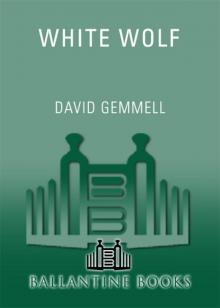 White Wolf
White Wolf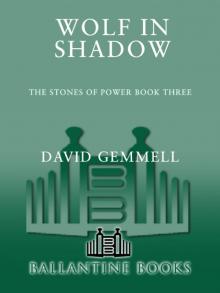 Wolf in Shadow
Wolf in Shadow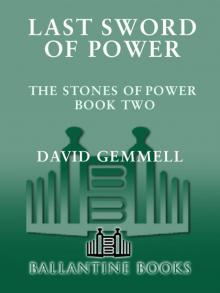 Last Sword of Power
Last Sword of Power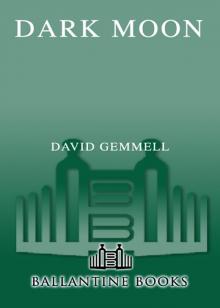 Dark Moon
Dark Moon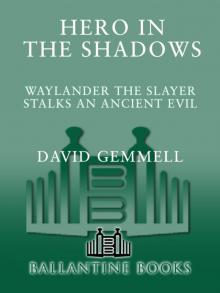 Hero in the Shadows
Hero in the Shadows Gemmell, David - Drenai 09 - Hero In The Shadows
Gemmell, David - Drenai 09 - Hero In The Shadows Waylander
Waylander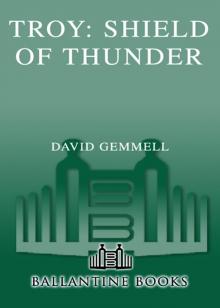 Shield of Thunder
Shield of Thunder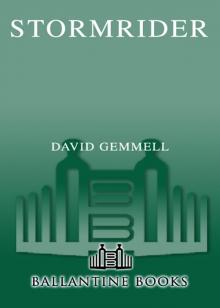 Stormrider Stormrider
Stormrider Stormrider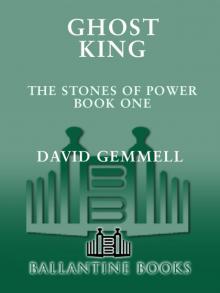 Ghost King
Ghost King Legend
Legend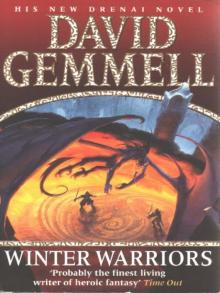 Winter Warriors
Winter Warriors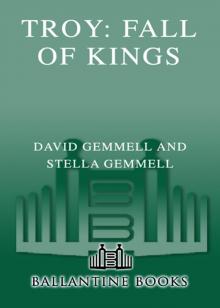 Fall of Kings
Fall of Kings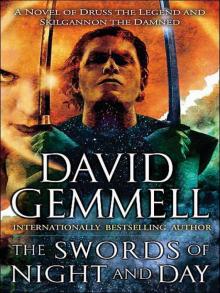 The Swords of Night and Day
The Swords of Night and Day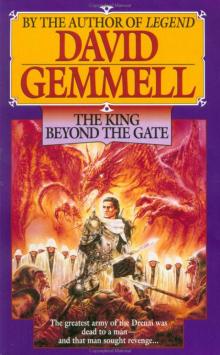 The King Beyond the Gate
The King Beyond the Gate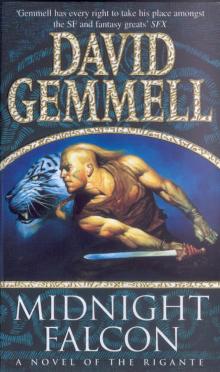 Midnight Falcon
Midnight Falcon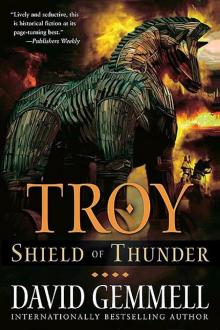 02 - Shield of Thunder
02 - Shield of Thunder In the Realm of the Wolf
In the Realm of the Wolf Ravenheart
Ravenheart The First Chronicles of Druss the Legend
The First Chronicles of Druss the Legend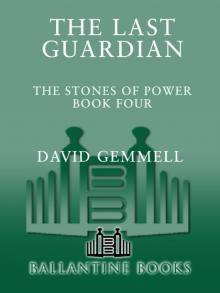 Last Guardian
Last Guardian Stormrider
Stormrider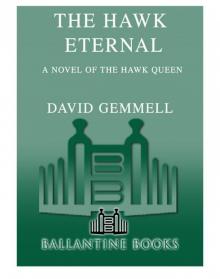 The Hawk Eternal
The Hawk Eternal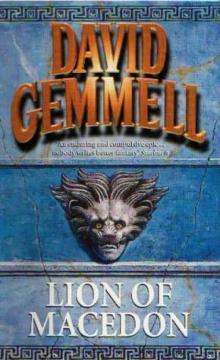 Lion of Macedon
Lion of Macedon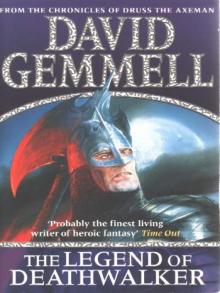 The Legend of Deathwalker
The Legend of Deathwalker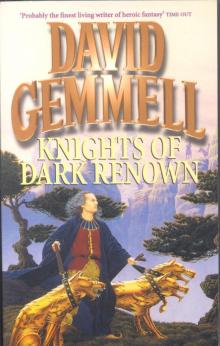 Knights of Dark Renown
Knights of Dark Renown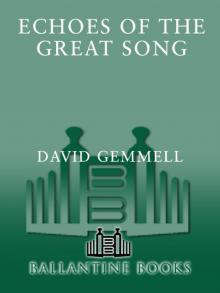 Echoes of the Great Song
Echoes of the Great Song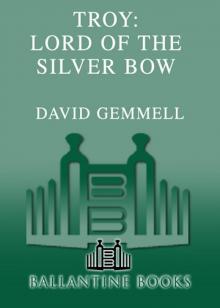 Lord of the Silver Bow
Lord of the Silver Bow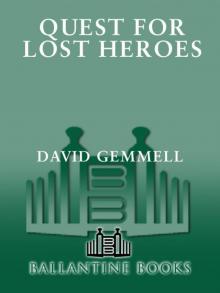 Quest for Lost Heroes
Quest for Lost Heroes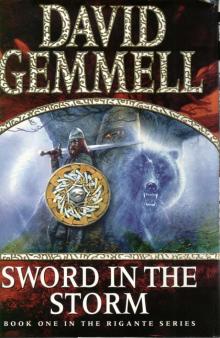 Sword in the Storm
Sword in the Storm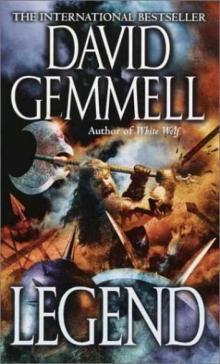 Drenai Saga 01 - Legend
Drenai Saga 01 - Legend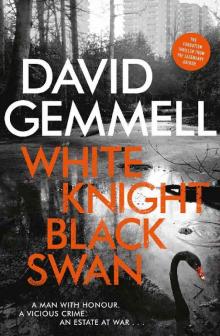 White Knight/Black Swan
White Knight/Black Swan![[Troy 02] - Shield of Thunder Read online](http://i1.bookreadfree.com/i/03/19/troy_02_-_shield_of_thunder_preview.jpg) [Troy 02] - Shield of Thunder
[Troy 02] - Shield of Thunder Lord of the Silver Bow t-1
Lord of the Silver Bow t-1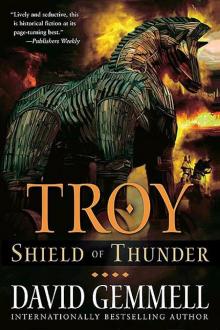 Shield of Thunder t-2
Shield of Thunder t-2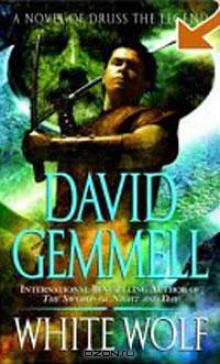 White Wolf: A Novel of Druss the Legend dt-10
White Wolf: A Novel of Druss the Legend dt-10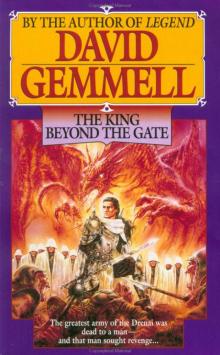 Drenai Saga 02 - The King Beyond the Gate
Drenai Saga 02 - The King Beyond the Gate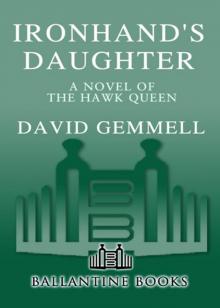 Ironhand's Daughter
Ironhand's Daughter Gemmell, David - Drenai 06 - The First Chronicles of Druss the Legend
Gemmell, David - Drenai 06 - The First Chronicles of Druss the Legend The Last Guardian
The Last Guardian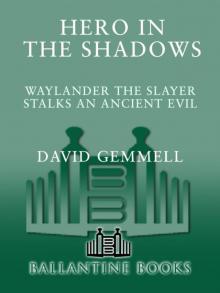 Hero in the Shadows: A Waylander the Slayer Novel
Hero in the Shadows: A Waylander the Slayer Novel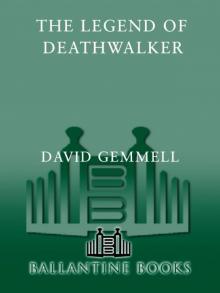 The Legend of the Deathwalker
The Legend of the Deathwalker